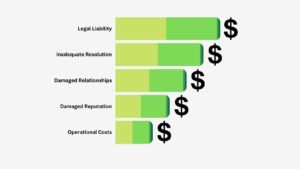The True Cost of a Botched Investigation

It’s a challenge to write an article that will benefit both regulatory and workplace investigators equally, but this one hits the mark. In our practice we are frequently retained to assist other investigators as investigation coaches. We guide them through some complexities and mentor them to success. Unfortunately, we are not always involved early enough and we need to fix issues in investigations. The cost of errors, complacency, and lack of best practice application to the work of investigators can be enormous.
In this article I speak to the nature of investigations (both regulatory and workplace), the leading cause of botched cases, and how to avoid the costly errors and their consequences.
A Review of Investigations
A botched investigation in either arena of investigations has significant consequences, many of which are similar. Before I go there, I would like to talk a little about the similarities of these investigations:
- They have mandates to gather information and determine facts so decisions can be made.
- Investigators are gathering evidence, interviewing parties and witnesses, and reviewing relevant information.
- Whether regulatory or workplace, the credibility of the investigation process relies on the investigator being fair, impartial, and free of bias.
- All investigations require acute sensitivity to how information is handled, shared, and distributed. Confidentiality is paramount to protect the privacy of individuals involved in an investigation.
- There are potential consequences for those under investigation in either type of case; and those consequences can have significant impacts on their careers. People rely on us to get it right.
-
Criticism can be levied against either type of investigation for such things as failing to adhere to expected timelines, thoroughness, inadequate or disputed outcomes, and lack of transparency.
Costs
Costs to an Investigator who Mismanages an Investigation
Investigators in Canada have been sued or penalized for doing poor investigations, particularly on the workplace side. In workplace investigations, there have been cases where investigators have been severely criticized for things like failing to maintain an open mind, bias, and failing to gather ALL relevant information. The consequence for the investigator and the organizations they represent can be lawsuits alleging negligence, breach of contract, or breach of confidentiality, depending on the circumstances. These ramifications for the individual investigator are bad enough, but it also impacts your reputation and ability to be entrusted with future work. Investigators who fail to adhere to professional and ethical standards or legal requirements, may be subject to disciplinary action or fines by licensing bodies. Of course, in cases like this some forms of misconduct or ethical violations are at issue, which is the subject for a future article. However, it is important to recognize all the pitfalls personally and professionally when it comes to working as an investigator.
Costs to the Organization and Involved Parties
Now let’s look more closely at the most concerning impact of a botched investigation: the impact of the involved parties. There are tangible and intangible impacts to be considered. Tangible costs might include things such as compensation to be paid to affected parties, the cost of a “do over” (which has its own set of issues), and legal fees to manage the fallout and potential judicial proceedings that can follow.
The intangible costs might be even greater in some ways. Loss of public trust and credibility, damage to the reputation of individuals and organizations involved, and potential long-term negative effects on decision-making and relationships. We are talking about significant and potentially far-reaching consequences.
Let’s take a closer look at these issues, first for regulatory investigations and then for workplace investigations:
The Costs of a Botched Regulatory Investigation

-
Legal Proceedings. Such as appeals to the courts. The regulator may be subject to defending its actions in court, which comes with costs for legal preparation and representation, and if the court process is not successful, potential costs for others’ legal fees.
-
Inadequate Resolution. If the investigation is not thorough or impartial, the underlying issue may not be properly addressed, leading to ongoing issues, and ultimately the potential that the public is not protected.
-
Unjust Outcomes. In some cases, a poorly done regulatory investigation may result in the revocation or suspension of a license or registration in circumstances where it might not be a just outcome.
-
Damaged Reputation. A flawed investigation can lead to a loss of public trust, reduced credibility, and a damaged reputation in the eyes of a regulator’s stakeholders.
-
Operational Costs. Remediation efforts, legal remedies, and the cost of rectifying any identified issues can be significant and disruptive to operations.
The Cost of a Botched Workplace Investigation

-
Legal Liability. A flawed investigation can result in legal action being taken against the company or individuals involved in the investigation.
-
Inadequate Resolution. If the investigation is not thorough or impartial, the root cause of the problem may not be identified and addressed, leading to repeated issues.
-
Damaged Relationships. The employees involved in the investigation may lose trust in the company and in each other, leading to a negative impact on morale and productivity.
-
Damaged Reputation. A poorly done investigation can damage the reputation of the company, making it more difficult to attract and retain top talent. It can also impact the ability for employees to have faith in the process, and therefore lead to unreported issues.
-
Redo Costs. Redoing the investigation or resolving legal issues can be costly and time-consuming, leading to further financial and operational disruption.
Tips to Avoid Mismanaged Investigations
So, what can we do about this? In short, quite a lot. You should:
1. Carefully select your investigators.
We previously wrote about how to select an investigator, here. Think about the background, experience, and reputation of those you entrust to investigate matters. Investigators are plentiful, good ones are hard to find, and great ones? Well, once you find one don’t let them go.
2. Have clear policies and procedures around investigation work within your organization.
These should speak to timelines, mandates, roles of various parties and what is expected from each, and reporting guidelines.
3. Have appropriate review processes.
The review of investigation reports prior to finalization is an important step in ensuring the accuracy, impartiality, and thoroughness of workplace investigations. A review can help to identify any errors or omissions, ensure that all relevant evidence has been considered, and provide a fresh perspective on the findings and recommendations.
4. Don’t underestimate the power of continuing education in investigators.
If you have internal (employed) investigators, invest in them. If you use external investigators, demand they demonstrate continuing education. You want to ensure they are utilizing best practices, understand trauma informed investigation, are aware of changes in legislation and case law that applies to their work; and they are also aware of trends in society and are competent to deal with issues of human rights.
Bottom Line
Botched investigations are easily prevented if we have the right people doing the right things. It sounds simple and for competent investigators it is, but we need to avoid complacency, and always remember the consequences of our work both positive and negative.

